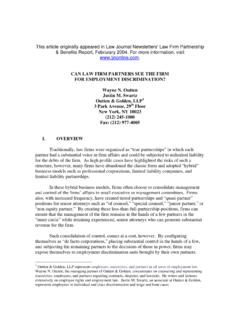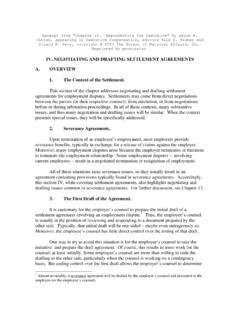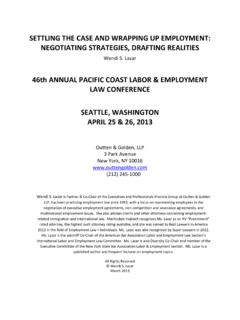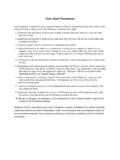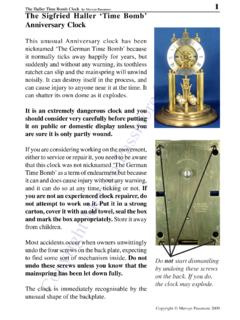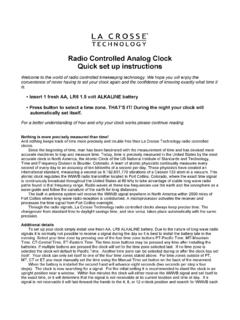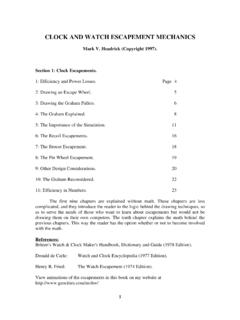Transcription of Off-The-Clock Claims from the Employee's …
1 1 Off-The-Clock Claims From The employee sPerspectiveAdam KleinandSean Compensable Time is Compensable? and Postliminary Clothes and Work Time In & Concluding Activities: Clothes, Equipment, & Animal , Lectures, Minimis Or Permit Standard Applied To Off-The - clock Duties Applied To Off-The-Clock Record Keeping Duties On Of Record Keeping Violation In Off-The-Clock Situated Standard AppliedIn Off-The-Clock Standard For Ordering Notice In Off-The-Clock Claims InStage Significant Number Of Opt-Ins Weighs In Favor Of Plaintiffs Evidence Does Not Warrant Notice Of TheScope Sought, Courts Nevertheless Frequently Order Notice Of AnAppropriate : Close of Class Actions Under State Of The Class Device As Opposed To Collective Advantages Under State Labor Laws In Off-The-Clock FLSA Collective Actions And State Class Actions2 IntroductionIn this paper we discuss legal issues relevant to Off-The-Clock wage andhour Claims .
2 By Off-The-Clock Claims we refer to Claims alleging thatthedefendantfailed to pay an employee for work time which was compensableunder relevant wage and hour law. Our primary focus is application of the FairLabor Standards Act( FLSA )to Off-The-Clock Time is Compensable?The starting point for analyzing potential Off-The-Clock FLSA claimsis todetermine whether the time for which compensation is sought is in factcompensableunder the FLSA. Though the FLSA does not definecompensablework,it does define employ broadlyas to suffer or permit to work. 1 TheSupreme CourtinTennessee Coal, Iron & R. Co. v. Muscoda Local No. 1232initiallydefined the meaning of work under the Act as those words are commonly used--as meaning physical or mental exertion (whether burdensome or not) controlledor required by the employer and pursued necessarily and primarily for thebenefit of the employer and his business. InAnderson v. Mt. Clemens PotteryCo.,3the Supreme Court shortly thereafter dropped the exertion requirement inpractice and emphasized that compensable work hours are characterizedinsteadby the employer s control of the employee s time.
3 The Court stated that the129 203(g).2321 590, 598 (1944).3328 680 (1946).3statutory workweek includes all time during which an employee isnecessarilyrequired to be on the employer's premises, on duty or at a prescribed workplace,[and that]the time spent in these activities must be accorded appropriatecompensation. 4 The implementingregulations definecompensable work timeas time spentby a worker for the benefit of the employer, with the employer sactual or constructive knowledge, performing the worker s principle activityor functions integral to his or her principle ExclusionsWhile the FLSA does not provide an express definition of compensablework, it does contain two express exclusions of activity that would otherwiseappear to meet the definition of compensable work just set are verynarrow, and it is important to recognize their precisecontours for purposes of evaluating the viability of Off-The-Clock and Postliminary WorkThe 1947 Portal-to -Portal Act, which amended the FLSA,provides thatemployers are not subject to FLSA requirements for activities which arepreliminary to or postliminary to [an Employee's ]
4 Principal activity or activities,which occur either prior to the time on any particular workday at which suchemployee commences, or subsequent to the time on any particular workday , , , heceases, such principal activity or activities. 6 Principal activities arethose that are an integral and indispensable part of an Employee's work ,preand post-shift work should be considered compensable principalactivity, rather than non-compensable preliminary or postliminary activity, if it is an integral and indispensable part of the principal activities for which coveredworkmen are 8 Employees have succeeded in making Off-The-Clock Claims , andindefeating employers attempts to invoke the preliminary/postliminarydefense,where pre or post-shift work wasperformed by employees because it wasnecessitated byemployees work assignments, even if the employer didnot askthat the work be performed outside employees scheduled SecondCircuit s decision inKosakow v.
5 New Rochelle Radiology Associates, ,9isillustrative. There, a radiological technologist was expected to receive patientsat the commencement of her shift, and in order to do so she hadto arrive earlytocomplete certain pre-shifttasks. Specifically,in order to be able to receivepatients at the beginning of her shiftshehad to come in 15 minutes early to turnon the x-ray machine to allow it to warm up, perform tests on the machineto629 254(a)(2).7 Imada v. City of Hercules, 138 1294 (9th Cir. 1998);Jerzak v. City of South Bend,996 F. Supp. 840 ( Ind. 1998).8 Reich v. New York City Transit Authority, 45 646, 649-50 (2d Cir. 1995)(quotingSteiner v. Mitchell, 350 247, 256, 76 330, 100 267 (1956)).9274 706 (2d Cir. 2001).5make sure it was working properly, and pull patient files for individuals withappointments that day. The defendant argued, and the lower court held, that theoff-the- clock work alleged by the plaintiff was excluded from FLSA coverage bythe Portal-to -Portal Second Circuit reversed, finding that the work wascompensableprincipal activity, rather than non-compensable preliminary orpostliminaryactivity, because it was an integral and indispensable part of the principalactivities forwhich covered workmen are 10It was irrelevant, thecourt explained, that the employer had not directed the plaintiff to come in early: If the proper performance of their job required the preparatory work to becompleted when the first walk-in patient could potentially arrive, the timeshould have been counted, regardless of whether anybody specifically instructedthem to arrive early.
6 11In general, preliminary or postliminary activities are excluded from FLSA coverageonlywhere (1) suchactivities are predominantly in employees' owninterests, (2) are undertaken for employees' own convenience, (3) are notrequired by the employer, and (4) are not necessary to the employee sperformance of his or her work 718 (quotingSteiner v. Mitchell, 350 247, 256, 76 330, 100 (1956)). Jerzak v. City of South Bend, 996 F. Supp. 840 ( 1998);Hellmers is, therefore, extremely Clothes and WashingSection 3(o)of the FLSA, added by amendment in 1949, provides that forpurposes of calculating hours worked under the Act, there shall be excludedany time spent in changing clothes or washing at the beginning or end of eachworkday which was excluded from measured working time during the weekinvolved by the express terms of or by custom or practice under a bona fidecollective-bargaining agreement applicable to the particular employee . 13 Aswill be discussed below, in the absence of a contractual exclusion, there are somecircumstances in which changing cloths and bathing at the beginning or end of awork day iscompensable and can be the basis of a successful Off-The-Clock , too,is an extremely narrow PracticeCourts efforts toapply thedefinition ofcompensable work time hasturned on highlyfact specific casecharacteristics.
7 Certain issues have recurred,however,and because the precise meaning of compensable work is crucial toevaluating Off-The-Clock Claims , we briefly touch uponthe mainonesthat havearisen in disputes over what work is exhaustive discussion ofthis largetopic is well beyond this scope of this paper, of Vestal, , 969 F. Supp. 837 ( 1997); v. Ewald Iron Co., 67 67 ( Ky. 1946).1329 3(o). TimeWhile ordinary travel from home to work and back is not compensable,14some work-related travel time is employees must initially reporttoone location, such as the employer's dispatching center, to receiveassignments, and then must proceed to travel to other job locations, the timespent traveling from theinitial place the employeereportedto otherjob locationsis ,if travel time spent includes any duties performed onbehalf of the employer or otherwise is for the employer s benefit, then the timeshould be to and from workin a special one-dayassignment to another city & Concluding Activities: Clothes, Equipment, &Animal CareAs stated above, t ime spenton integral and indispensable dutiesperformed for the employer s benefit will be compensable.
8 Such duties includetime spent changingin to/out ofspecial work uniforms,18and time spentservicing or otherwise caring for the employer s equipment (including the1429 254(a); 29 ;Preston v. Settle Down Enterprises, Inc., 90 F. Supp. 2d 1267( Ga. 2000);Dole v. Enduro Plumbing, Inc., 1990 Dist. LEXIS 20135 ( 1990).16 See Baker v. Barnard Constr. Co., 146 1214 (10th Cir. 1998) (return traveltime for refueling and restocking welding rigs was integral to welding work andcompensable).17 See29 , , Steiner v. Mitchell, 350 247 (1956) (battery plant workers must bepaid for time spent changing clothes and showering to avoid caustic and toxicmaterials).8employer s animals). and rest periods of 5 to 20 minutes are work time for which anemployee is to be , an employee who works8:00 to 5:00 a hour unpaid lunch and two 15 minute breaks one in the morning andthe other in the afternoon has workedan hour work day andnotan 8 hourwork a period to be classified as a bona fide meal period, and thusnon-compensable, an employee must be completely relieved from duty for thepurposes of eating regular meals.
9 21 Because such breaks must be compensatedunless the employee is completely relieved from duty, an employer mustcompensate break time whenan employee is required to remain on (or even near ) the premises and available for , , Reich v. Monfort, 144 1329 (10thCir. 1998) (slaughterhouseemployees to be paid for time spent washing up and removing safetyequipment);Holzapfel v. Town of Newburgh, 145 516 (2ndCir. 1998) (policeofficers must be paid for time walking, feeding, grooming police dogs).2029 ;Hartsell v. Dr. Pepper Bottling Co., 207 269 (5th Cir. 2000);Donovan v. Bel-Loc Diner, Inc., 780 1110, 1115 (4th Cir. 1985).22 See Reich v. v. Southern New England Telecommunications Corp., 121 58 (2dCir. 1996) (half-hour lunch break must be compensated because employeesrequired to remain at or near the work site so they could intervene if any threatto security arose during lunch). , Lectures, lectures, meetings, training programs and similaractivities iscompensableunless attendance is voluntary, outside of normalworking hours, and not related to the Employee's TimeIf employees, while on-call,are required to stayon the employer'spremises or so close by thattheyare unable toengage in personal activities, suchon-call timemustbe if employees do not have to remainonornear the employer s premises, if their on-call duties restricttheir travel,andoccupy their attention to the point of excluding other activities, such time will ,according to the de minimis doctrine, otherwise compensabletime is not actionable under the FLSAif it is sotriviallysmallthat it cannot berecorded and has noreal value even in aggregate.
10 [A] few seconds or minutes23 See29 ;Dade County v. Alvarez, 124 1380 ( ),cert. denied, 523 1122, 118 1804, 140 943 (1998).24 See29 ;Armour & Co. v. Wantock, 323 126, 65 165, 118 (1944);Skidmore v. Swift & Co., 134, 65 161, 89 124(1944).25 Cross v. Arkansas Forestry Commission, 938 912 (8th ) (On-call timecompensable where employees had to monitor hand-held radios twenty-fourhours per day, and be prepared to respond to emergency calls immediately).10of work beyond the scheduled working hours .. may be absurdities are not 26In order to determine whethertimeworked is de minimis, thefollowing three factorsare to be weighed: (1) thepractical administrative difficulty of recording the additional time; (2) the size ofthe claim in the aggregate; and (3) whether the claimants performed the work ona regular basis. 27 Employers .. must compensateemployees for even smallamounts of daily time unless that time is so miniscule that it cannot, as anadministrative matter, be recorded for payroll purposes.
